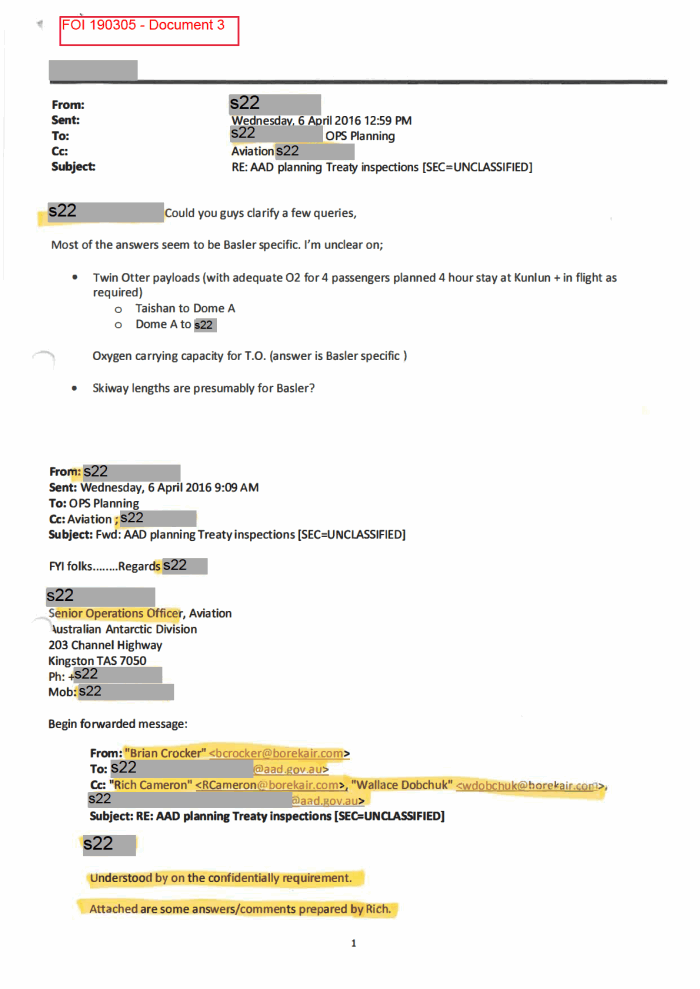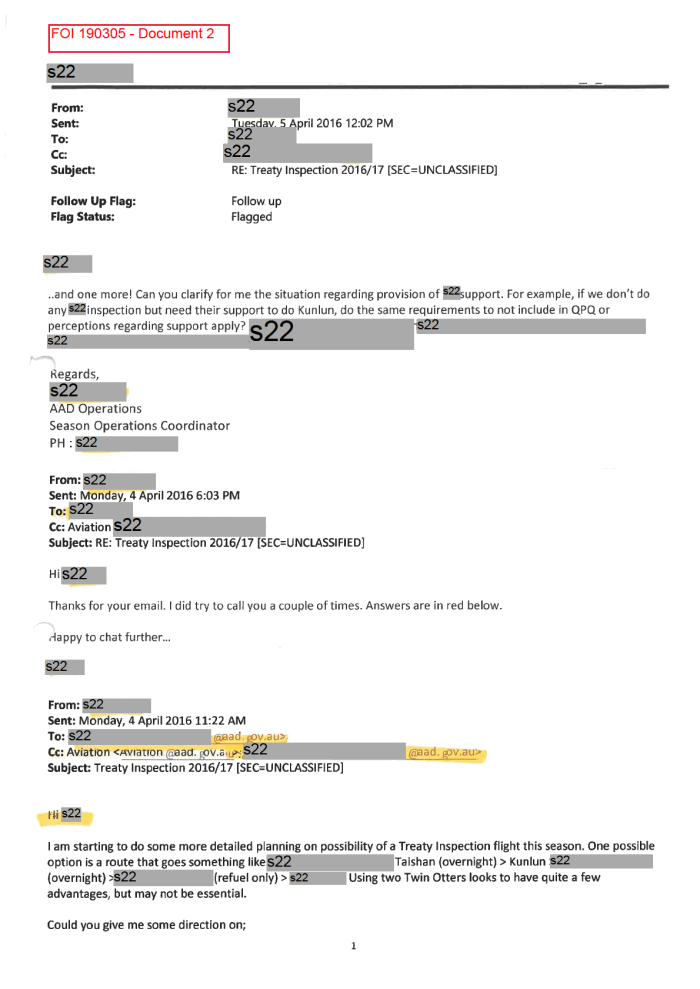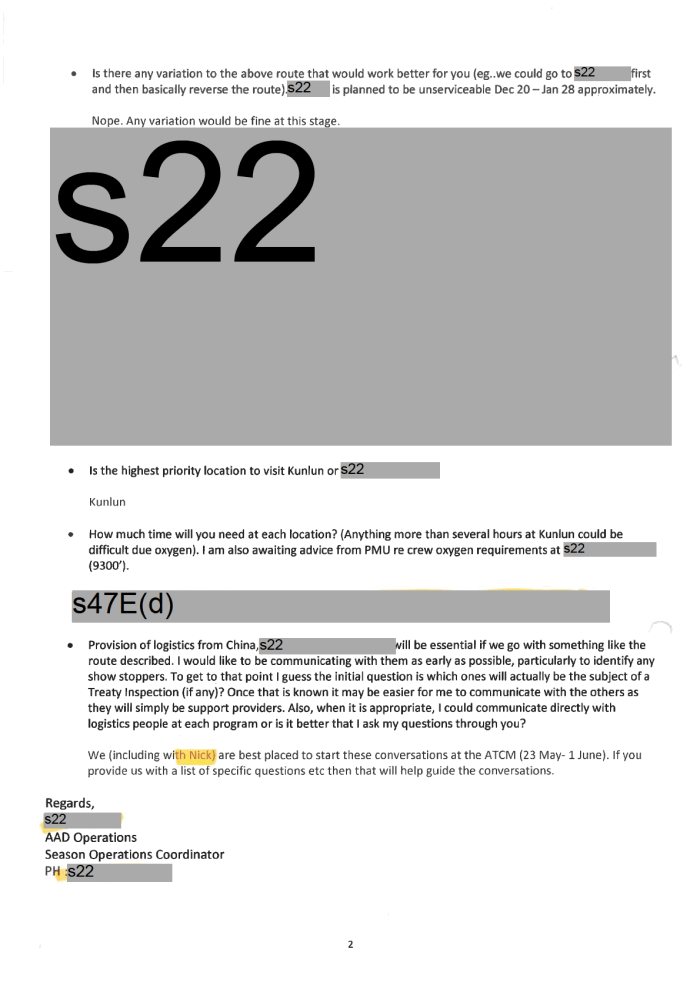Antarctic nations meet this week as emails reveal Australia's air capability is trumped by China
An inspection of a key Chinese base deep within the Australian Antarctic Territory was cancelled after a failure to overcome Australia's limited Antarctic capabilities.
Key points:
- Emails from inside Australia's Antarctic Division reveal the difficulties reaching a Chinese base deep within the Australian Antarctic Territory
- Ultimately the plan to inspect the base was cancelled despite it being deemed a high priority, but China flew in and out of the base less than a year later
- The annual Antarctic Treaty meeting is being held this week in Prague
Documents obtained by the ABC reveal Australian officials abandoned plans to visit the Kunlun base in 2016, despite the site being deemed a high priority for inspection.
Less than a year later, China's new fixed-wing polar aircraft made its first landing at the same base — located at a high point of the Antarctic ice sheet, approximately 4,000 metres high — according to reports in China's state news service CCTV.
Inspections are allowed under the Antarctic Treaty to help ensure countries do not breach the laws of Antarctica, which ban military activity or mineral exploration.
The ABC reported in March that bases in Australia's claim were not being inspected.
Alessandro Antonello, an Antarctic historian from the University of Melbourne, said inspections "don't need to be planned whatsoever".
"If you have the capacity — you can just turn up at another country's base and say 'we are here to inspect you'," he said.
No reliable capability
A 2014 report from former Antarctic Division head Tony Press noted Australia had no "reliable capability to access inland regions of the Australian Antarctic Territory".
Australia uses Basler BT-67 and DHC-Twin Otter aircraft for intracontinental operations, owned and operated by Canadian aeroplane charter company Kenn Borek Air.
 PHOTO: The Basler and Twin Otter aircraft used by the Australian Antarctic Division. (Supplied: Chris Wilson/AAD)
PHOTO: The Basler and Twin Otter aircraft used by the Australian Antarctic Division. (Supplied: Chris Wilson/AAD)
Although the Chinese base at Kunlun is within Australia's claim, its remoteness and altitude appears to have prevented a planned inspection in 2016.
In the set of emails obtained by the ABC through a Freedom of Information request, one Antarctic Division official asked a Kenn Borek Air representative whether the plan to visit Kunlun was "achievable".
Another official wrote that "anything more than several hours at Kunlun could be difficult due [to] oxygen".
"Provision of logistics from China [redacted] will be essential if we go with something like the route described," the official wrote.
Eventually, the Antarctic Division's operations coordinator confirmed the cancellation.
"Been moving a fair bit in the last few days. Latest is no Kunlun," they wrote.
Ultimately, Australia inspected only the US base at the South Pole that summer.
Almost simultaneously, however, China announced on state-run media that it had landed its own Basler aircraft — dubbed the Snow Eagle and also operated by Kenn Borek Air — at Kunlun station.
The plane has repeated the trip on two occasions since, according to Xinhua.
Information provided to the Senate in March stated it would cost approximately $500,000 for Australia to conduct an inspection of an inland Antarctic base, and that "in some cases modest support may be required from another national Antarctic program".
Australia maintains a claim to 42 per cent of Antarctica based on its early 20th century exploration of the area, though most countries — including China and the United States — do not recognise it.
The documents also reveal that Kunlun was deemed a high priority location — yet the station has still not been inspected more than three years later.
 INFOGRAPHIC: China's base at Dome A is thousands of kilometres from the coast. (Supplied: University of Arizona)
INFOGRAPHIC: China's base at Dome A is thousands of kilometres from the coast. (Supplied: University of Arizona)
Following ABC's reporting earlier this year, new Antarctic Division head Kim Ellis pledged in a Senate hearing in April to look at inspecting every station located on Australia's claim.
"Our plan will look at all of the 18 stations throughout the Australian areas of influence in East Antarctica, looking at how we can program inspections on as many of those as possible," he said.
A Department of Foreign Affairs and Trade (DFAT) spokesperson told the ABC that Australia was committed to conducting "regular" inspections.
"The conduct of inspections is informed by a range of considerations including our logistic arrangements, safety and other Australian Antarctic Program priorities and activities," the spokesperson said.
New Australian investment in Antarctica promises a new icebreaker ship, upgraded bases, the continent's first paved runway and a "logistics aviation link" with a mobile inland research station.
Meeting this week
This week representatives of nations that have signed the Antarctic Treaty will meet in Prague, Czech Republic, to discuss administration of the icy continent.
Under the treaty, territorial claims are frozen. Several nations have recently announced plans to expand their footprint and activities, while other pressing issues include the rapidly expanding tourism sector.
Dr Antonello said the meeting was likely to continue the Antarctic tradition of "fairly good" relations, but underlying tensions may simmer.
"The issue with Antarctica is that it often simmers below the very highest levels of government," he said.
He recounted that Australia had been "perhaps the most welcoming" Antarctic power to Chinese scientists since the late 1970s and said Hobart wants to position itself as the major gateway city for China's Antarctic program.
"Any apparent conflict or contest in a geopolitical sense will be overridden by the real urge to keep good relations to ensure Chinese and Australian scientists can work together," he said.
However, Dr Antonello noted the opaque nature of proceedings. The meeting is closed to media and meeting reports are not available for several months.
"Those reports are filled with diplomatic language which does try to cover up some of the tensions," he said.
DFAT's spokesperson said the priorities for Australia at the meeting included supporting work to ensure the growth in Antarctic tourism is carefully managed, and reviewing arrangements for aviation activity in Antarctica.
China has previously attempted to establish a specially managed area around the Kunlun base within Australia's claim, but treaty nations have so far rebuffed those attempts.
A Hong Kong newspaper, quoting an unnamed Chinese Government researcher, reported in April that a base set up by the US was an "attempt to block" the management plan by China and it "appears to be backed by the US military".
However, enquiries by the ABC confirmed that no such US base exists.





No comments:
Post a Comment
Comments always welcome!